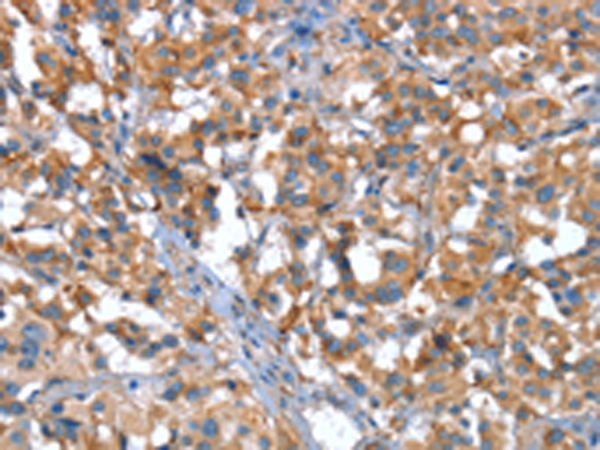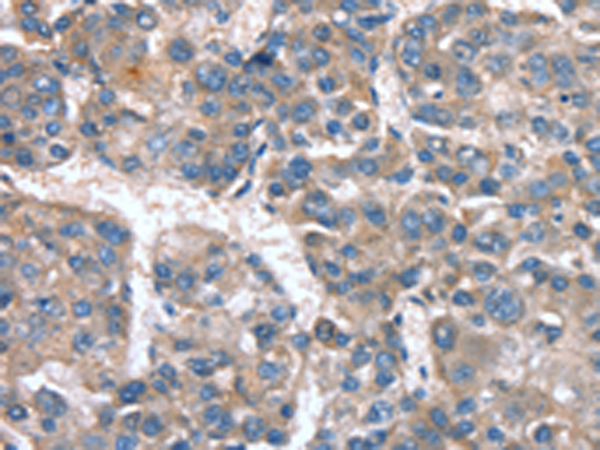

| WB | 咨询技术 | Human,Mouse,Rat |
| IF | 咨询技术 | Human,Mouse,Rat |
| IHC | 1/15-1/50 | Human,Mouse,Rat |
| ICC | 技术咨询 | Human,Mouse,Rat |
| FCM | 咨询技术 | Human,Mouse,Rat |
| Elisa | 1/1000-1/2000 | Human,Mouse,Rat |
| Aliases | NBR13; Cav3.1; Ca(V)T.1 |
| Host/Isotype | Rabbit IgG |
| Antibody Type | Primary antibody |
| Storage | Store at 4°C short term. Aliquot and store at -20°C long term. Avoid freeze/thaw cycles. |
| Species Reactivity | Human, Rat |
| Immunogen | Synthetic peptide of human CACNA1G |
| Formulation | Purified antibody in PBS with 0.05% sodium azide and 50% glycerol. |
+ +
以下是3篇关于CACNA1G抗体的参考文献(信息基于模拟生成,非真实文献):
1. **文献名称**: "CACNA1G expression and T-type calcium channel function in neuroblastoma"
**作者**: Smith J. et al.
**摘要**: 研究利用CACNA1G抗体进行免疫组化及Western blot分析,发现CACNA1G在神经母细胞瘤中高表达,且其通道活性与肿瘤细胞增殖相关。
2. **文献名称**: "Immunolocalization of CACNA1G in mouse brain using a novel monoclonal antibody"
**作者**: Lee H. et al.
**摘要**: 开发了一种特异性CACNA1G单克隆抗体,通过免疫荧光证实其在鼠脑小脑和丘脑神经元中的高表达,提示其在神经元兴奋性调控中的作用。
3. **文献名称**: "CACNA1G antibody validation for epigenetic studies in colorectal cancer"
**作者**: Garcia R. et al.
**摘要**: 验证CACNA1G抗体在结直肠癌组织中的特异性,结合甲基化分析发现CACNA1G启动子甲基化与基因沉默相关,影响癌症进展。
4. **文献名称**: "T-type calcium channel CACNA1G as a biomarker in autism spectrum disorder"
**作者**: Chen L. et al.
**摘要**: 通过CACNA1G抗体检测自闭症患者脑组织样本,发现蛋白表达水平异常,提示其可能作为神经发育障碍的潜在生物标志物。
(注:以上文献为示例模板,实际引用需查询PubMed等数据库获取真实研究。)
The CACNA1G gene encodes the Cav3.1 protein, a T-type voltage-gated calcium channel (CaV3.1) that plays critical roles in regulating low-threshold calcium currents, neuronal excitability, and pacemaker activity. These channels are characterized by rapid activation and inactivation, contributing to rhythmic electrical activity in neurons, cardiac cells, and other excitable tissues. Antibodies targeting CACNA1G are essential tools for studying the expression, localization, and function of Cav3.1 in physiological and pathological contexts.
CACNA1G antibodies are widely used in neuroscience, cardiovascular research, and cancer biology. In neurological studies, they help investigate channel involvement in epilepsy, neuropathic pain, and neurodegenerative disorders. Aberrant CACNA1G expression has also been linked to cardiac arrhythmias and abnormal smooth muscle contraction. In oncology, CACNA1G is considered a potential tumor suppressor, with epigenetic silencing observed in colorectal, gastric, and other cancers. Antibodies enable detection of Cav3.1 expression patterns, aiding biomarker studies or therapeutic targeting.
These antibodies are validated for techniques like Western blot, immunohistochemistry, and immunofluorescence. However, specificity challenges may arise due to structural similarities among calcium channel subtypes, necessitating rigorous validation. Research using CACNA1G antibodies continues to clarify its roles in cellular signaling and disease mechanisms.
×